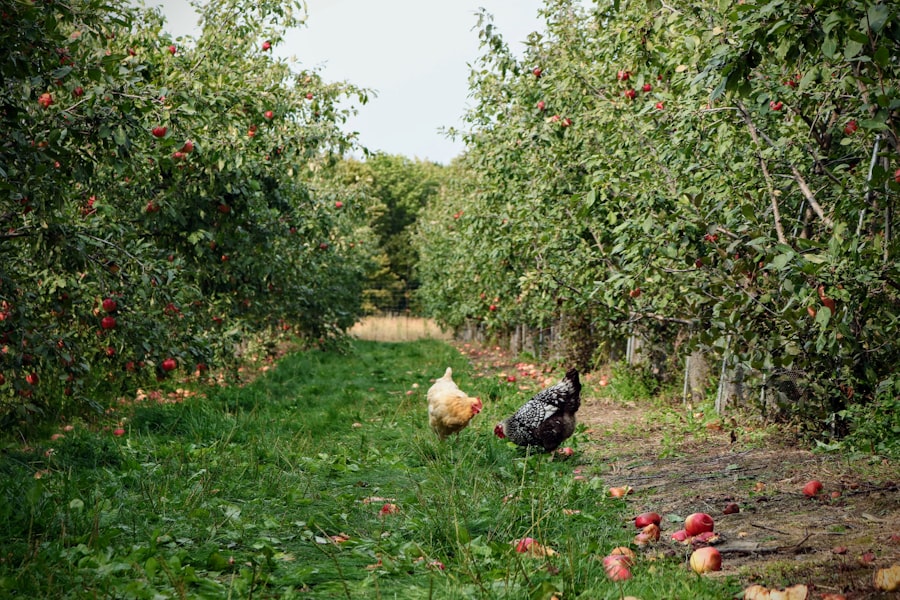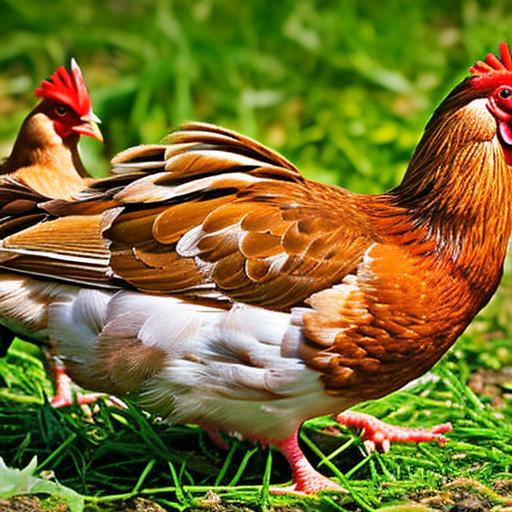Raising chickens has become increasingly popular in recent years, and for good reason. Not only do chickens provide a sustainable source of fresh eggs, but they also offer a range of other benefits. Chickens can help control pests in your garden, provide natural fertilizer for your plants, and even serve as friendly and entertaining pets. However, before diving into chicken ownership, it is important to understand the basics.
Raising chickens requires time, effort, and commitment. It is essential to have a good understanding of their needs and how to meet them. This includes providing proper housing, feeding them a balanced diet, and ensuring their overall health and well-being. By familiarizing yourself with the basics of raising chickens, you can set yourself up for success and enjoy all the benefits that come with it.
Key Takeaways
- Raising chickens requires understanding local laws and regulations
- Choosing the right chicken breed is important for your environment and needs
- Building a chicken coop requires essential features and design considerations
- Maintaining a clean and healthy chicken coop environment is crucial
- Feeding and caring for your chickens requires tips for first-time owners
Assessing Your Living Situation: Can You Keep Chickens Where You Live?
Before bringing chickens into your life, it is crucial to assess whether you can keep them where you live. There are several factors to consider when determining if chickens are allowed in your area. Firstly, check your local zoning laws and regulations to see if there are any restrictions on owning chickens. Some cities or towns may have specific rules regarding the number of chickens you can keep or the distance they must be kept from neighboring properties.
Additionally, consider the size of your property and whether it can accommodate a chicken coop and outdoor space for the chickens to roam. Chickens require adequate space to move around and engage in natural behaviors such as scratching and dust bathing. It is also important to consider the noise factor, as roosters can be quite loud and may not be allowed in residential areas.
To find out if your city or town allows chicken ownership, contact your local government or zoning department. They will be able to provide you with information on any regulations or permits required for keeping chickens. You can also reach out to local chicken owners or join online forums and groups to connect with others in your area who may have experience with chicken ownership.
Understanding Local Laws and Regulations Regarding Chicken Ownership
Once you have determined that you can keep chickens where you live, it is important to familiarize yourself with the local laws and regulations regarding chicken ownership. These laws can vary greatly depending on your location, so it is crucial to do your research and ensure that you are in compliance.
Common laws and regulations regarding chicken ownership may include restrictions on the number of chickens allowed, requirements for coop size and design, and guidelines for waste management. Some areas may also have specific rules regarding the disposal of chicken manure or noise restrictions for roosters.
To stay compliant with local laws, it is important to understand and adhere to these regulations. This may involve obtaining any necessary permits or licenses, ensuring that your coop meets the required specifications, and following proper waste management practices. By staying informed and following the rules, you can avoid potential fines or legal issues and maintain a positive relationship with your neighbors and community.
Choosing the Right Chicken Breed for Your Environment and Needs
When it comes to choosing the right chicken breed, there are several factors to consider. Different breeds have different characteristics, including size, temperament, egg-laying ability, and cold or heat tolerance. It is important to choose a breed that is well-suited to your environment and meets your specific needs.
If you live in a colder climate, you may want to choose a breed that is known for its cold hardiness. Breeds such as the Rhode Island Red or the Plymouth Rock are known for their ability to withstand cold temperatures. On the other hand, if you live in a hot climate, breeds such as the Leghorn or the Sussex may be better suited due to their heat tolerance.
Consider whether you are primarily interested in egg production or if you are looking for chickens that can also serve as pets. Some breeds, such as the Australorp or the Orpington, are known for their excellent egg-laying abilities, while others, like the Silkie or the Polish, are popular for their unique appearance and friendly personalities.
It is also important to consider the size of your property and the space available for your chickens. If you have a smaller backyard, you may want to choose a breed that is known for its ability to thrive in confined spaces, such as the Bantam or the Cochin.
By considering these factors and doing some research on different chicken breeds, you can choose the right breed that will thrive in your environment and meet your specific needs.
Building a Chicken Coop: Essential Features and Design Considerations
One of the most important aspects of raising chickens is providing them with a safe and comfortable living space. A well-designed chicken coop is essential for protecting your chickens from predators, providing shelter from the elements, and ensuring their overall health and well-being.
When building a chicken coop, there are several essential features to consider. Firstly, ensure that the coop is secure and predator-proof. This includes using sturdy materials, such as hardware cloth or welded wire, for the walls and windows. Install locks or latches on all doors to prevent predators from gaining access.
Proper ventilation is also crucial for maintaining a healthy coop environment. Ensure that there are windows or vents that can be opened and closed to allow for fresh air circulation. However, be sure to provide adequate insulation during colder months to protect your chickens from extreme temperatures.
Consider the size of your flock when designing your coop. Chickens require a certain amount of space to move around comfortably. As a general rule of thumb, allow at least 4 square feet of floor space per chicken inside the coop and 10 square feet per chicken in the outdoor run area.
Provide roosting bars or perches for your chickens to sleep on. These should be elevated off the ground and spaced at least 12 inches apart to prevent overcrowding. Nesting boxes should also be provided for your hens to lay their eggs. Aim for one nesting box per 3-4 hens, and ensure that they are filled with clean bedding material.
By considering these essential features and design considerations, you can create a chicken coop that meets the needs of your flock and provides a safe and comfortable living space.
Chicken Coop Plans: DIY vs. Pre-Made Options

When it comes to building a chicken coop, you have the option of either using DIY plans or purchasing a pre-made coop. Both options have their pros and cons, so it is important to consider your budget, time constraints, and level of DIY skills before making a decision.
DIY chicken coop plans offer the advantage of customization. You can design and build a coop that meets your specific needs and fits your available space. DIY plans also allow you to save money, as you can source materials locally and build the coop yourself. There are many free or affordable chicken coop plans available online, ranging from simple designs to more elaborate structures.
However, building a chicken coop from scratch requires time, effort, and some level of DIY skills. It is important to have the necessary tools and equipment, as well as basic carpentry knowledge. If you are not confident in your DIY abilities or do not have the time to dedicate to building a coop, then purchasing a pre-made option may be a better choice.
Pre-made chicken coops offer convenience and ease of setup. They come in a range of sizes and designs, allowing you to choose one that suits your needs. Pre-made coops are typically made from durable materials and often come with features such as nesting boxes, roosting bars, and ventilation systems already built-in.
However, pre-made coops can be more expensive than building your own. They may also have limited customization options, so it is important to choose one that meets your specific requirements. Additionally, some pre-made coops may not be as sturdy or predator-proof as a well-built DIY coop.
By weighing the pros and cons of DIY plans and pre-made options, you can choose the best option for your budget, time constraints, and level of DIY skills.
Maintaining a Clean and Healthy Chicken Coop Environment
Maintaining a clean and healthy coop environment is essential for the overall health and well-being of your chickens. A clean coop helps prevent the spread of diseases, reduces the risk of pests and parasites, and ensures that your chickens have a comfortable living space.
Regular cleaning is key to maintaining a clean coop environment. This includes removing any accumulated droppings, replacing soiled bedding material, and cleaning out the nesting boxes. Aim to clean the coop at least once a week, or more frequently if necessary.
Provide proper ventilation to prevent the buildup of ammonia from chicken droppings. Ammonia can cause respiratory issues in chickens, so it is important to ensure that there is adequate airflow in the coop. Open windows or vents during the day and close them at night to maintain a comfortable temperature while still allowing for fresh air circulation.
Regularly inspect the coop for signs of pests or parasites. These can include mites, lice, or rodents. If you notice any signs of infestation, take immediate action to address the issue. This may involve using natural pest control methods or seeking professional help if necessary.
Keep the outdoor run area clean by regularly raking or removing any accumulated droppings. This helps prevent the spread of diseases and reduces odors. Consider rotating your chickens’ outdoor space to allow the grass to recover and prevent overgrazing.
By maintaining a clean and healthy coop environment, you can ensure that your chickens are happy and healthy, and enjoy the benefits of fresh eggs and sustainable living.
Feeding and Caring for Your Chickens: Tips for First-Time Owners
Feeding and caring for your chickens is an important aspect of chicken ownership. Providing a balanced diet and meeting their basic needs will help ensure their overall health and well-being. Here are some tips for first-time chicken owners:
1. Provide a balanced diet: Chickens require a balanced diet that includes a mix of grains, protein, vitamins, and minerals. A commercial chicken feed that is specifically formulated for their age and purpose (such as laying hens or meat birds) is a good starting point. Supplement their diet with fresh fruits and vegetables, kitchen scraps, and occasional treats such as mealworms or sunflower seeds.
2. Ensure access to clean water: Chickens require access to clean, fresh water at all times. Provide waterers that are easy to clean and refill. During colder months, consider using heated waterers to prevent freezing.
3. Offer grit and oyster shell: Grit helps chickens digest their food by grinding it in their gizzard. Oyster shell provides calcium, which is essential for egg production. Offer these supplements free-choice in separate containers.
4. Provide a dust bath area: Chickens love to dust bathe, which helps keep their feathers clean and free from parasites. Create a designated area in the coop or run by filling a shallow container with sand or fine dirt mixed with wood ash or diatomaceous earth.
5. Monitor their health: Regularly check your chickens for any signs of illness or injury. Look out for changes in behavior, appetite, or egg production. If you notice any abnormalities, consult a veterinarian who specializes in poultry.
6. Practice biosecurity: To prevent the spread of diseases, practice good biosecurity measures. This includes keeping your coop clean, limiting visitors to your flock, and quarantining new chickens before introducing them to your existing flock.
By following these tips and providing proper care and nutrition, you can ensure that your chickens are healthy and happy.
Dealing with Common Issues and Challenges in Chicken Ownership
While raising chickens can be a rewarding experience, it is not without its challenges. Here are some common issues that chicken owners may face and tips for addressing them:
1. Predators: Predators such as raccoons, foxes, or hawks can pose a threat to your chickens. Ensure that your coop is secure and predator-proof by using sturdy materials and installing locks or latches on all doors. Consider using motion-activated lights or alarms to deter predators.
2. Egg-eating: Occasionally, chickens may develop a habit of eating their own eggs. This can be due to boredom, nutritional deficiencies, or overcrowding. Provide plenty of enrichment in the form of toys or treats, ensure a balanced diet, and provide adequate space for your chickens to prevent this behavior.
3. Feather pecking: Feather pecking can occur when chickens peck at each other’s feathers, leading to feather loss and potential injury. This behavior can be caused by overcrowding, boredom, or nutritional deficiencies. Provide plenty of space for your chickens, offer enrichment activities, and ensure a balanced diet to prevent feather pecking.
4. Broodiness: Some hens may become broody, which means they want to sit on eggs and hatch them. While broodiness is a natural behavior, it can disrupt egg production. If you do not want your hen to hatch eggs, you can try breaking her broodiness by removing her from the nest and providing a cooler environment.
5. Molting: Molting is the natural process of shedding old feathers and growing new ones. During this time, chickens may stop laying eggs and appear scruffy or bald. Ensure that your chickens have a balanced diet and provide extra protein to support feather growth during molting.
6. Egg quality issues: Occasionally, chickens may lay eggs with quality issues such as thin shells, soft shells, or no shells at all. This can be caused by nutritional deficiencies, stress, or age. Ensure that your chickens have a balanced diet and provide supplemental calcium to support eggshell production.
By addressing these common issues and challenges in chicken ownership, you can ensure the health and well-being of your flock and enjoy the benefits of fresh eggs and sustainable living.
Enjoying the Benefits of Fresh Eggs and Sustainable Living with Your Own Chickens
Owning chickens offers a range of benefits, from a sustainable source of fresh eggs to natural pest control in your garden. By raising your own chickens, you can enjoy the following advantages:
1. Fresh eggs: One of the main benefits of owning chickens is having a constant supply of fresh eggs. Homegrown eggs are often considered to be tastier and more nutritious than store-bought eggs. You can also have peace of mind knowing exactly how your eggs were produced and what your chickens were fed.
2. Sustainable living: Raising chickens allows you to embrace a more sustainable lifestyle. Chickens help reduce food waste by eating kitchen scraps and provide natural fertilizer for your garden. They also help control pests such as slugs, snails, and insects, reducing the need for chemical pesticides.
3. Educational opportunities: Keeping chickens can be a great educational experience for both children and adults. It teaches responsibility, empathy, and the importance of caring for animals. Children can learn about the life cycle of chickens, from hatching eggs to raising chicks to watching them grow into adult birds. They can also learn about the different breeds of chickens and their unique characteristics. Additionally, keeping chickens can provide opportunities for hands-on learning in subjects such as biology, agriculture, and sustainability. Adults can also benefit from the educational aspect of chicken keeping, as they can learn about the nutritional needs of chickens, proper coop maintenance, and the importance of providing a safe and healthy environment for their feathered friends. Overall, keeping chickens can be a valuable educational experience that promotes lifelong learning and a deeper understanding of the natural world.
If you’re wondering if you can keep chickens where you live, you may also be interested in learning about the importance of a heater for a chicken coop. This article from Poultry Wizard provides valuable insights on how to keep your feathered friends warm and comfortable during colder months. Discover the benefits of using a heater in your chicken coop and ensure your chickens stay cozy and healthy all year round. Check out the article here.
FAQs
What are the benefits of keeping chickens?
Keeping chickens can provide a source of fresh eggs, natural pest control, and fertilizer for gardens. They can also be great pets and provide entertainment.
Are there any laws or regulations regarding keeping chickens?
Yes, there may be local laws and regulations regarding keeping chickens. It is important to check with your city or county government to see if there are any restrictions or permits required.
Can I keep chickens in a residential area?
It depends on the local laws and regulations. Some cities and towns allow chickens in residential areas, while others do not. It is important to check with your local government before keeping chickens.
How much space do chickens need?
Chickens need at least 2-3 square feet of space per bird in their coop, and at least 8-10 square feet of outdoor space per bird to roam and forage.
What do chickens eat?
Chickens eat a variety of foods, including commercial chicken feed, grains, fruits, vegetables, and insects. It is important to provide a balanced diet for your chickens.
What kind of housing do chickens need?
Chickens need a secure coop to sleep in at night, and a fenced outdoor area to roam and forage during the day. The coop should be well-ventilated, predator-proof, and have nesting boxes for egg-laying.
What are some common health issues for chickens?
Common health issues for chickens include respiratory infections, mites and lice, and egg-laying problems. It is important to provide a clean and healthy environment for your chickens and to seek veterinary care if necessary.
Do chickens make a lot of noise?
Chickens do make noise, but it is generally not as loud as other farm animals. Roosters are the loudest and may crow early in the morning. Hens may also cluck and make other noises throughout the day.
Meet Walter, the feathered-friend fanatic of Florida! Nestled in the sunshine state, Walter struts through life with his feathered companions, clucking his way to happiness. With a coop that’s fancier than a five-star hotel, he’s the Don Juan of the chicken world. When he’s not teaching his hens to do the cha-cha, you’ll find him in a heated debate with his prized rooster, Sir Clucks-a-Lot. Walter’s poultry passion is no yolk; he’s the sunny-side-up guy you never knew you needed in your flock of friends!







